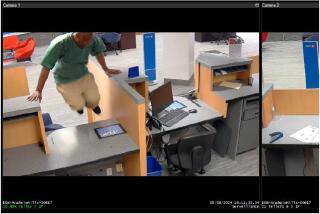Ex-LAPD Officer Sentenced in Bank of America Robbery
- Share via
Still refusing to disclose what happened to the loot, a former Los Angeles police officer was sentenced to 14 years and three months in federal prison Monday for robbing $722,000 from a Bank of America branch.
David A. Mack, a national collegiate track star and decorated LAPD veteran, was convicted of staging the armed robbery in 1997 with the help of his paramour, an assistant manager at the bank branch near USC.
Errolyn Romero, his girlfriend, ordered extra cash on the day of the robbery and buzzed Mack through two security doors leading to the bank vault. She pleaded guilty and is awaiting sentencing.
Two male accomplices got away.
Before handing down the sentence Monday, U.S. District Judge Robert M. Takasugi asked the 38-year-old Mack if he cared to say where the stolen money could be located.
On the advice of his lawyer, Donald Re, Mack declined. He also passed up an invitation to speak on his own behalf.
Assistant U.S. Atty. Stephen G. Wolfe told the court that Mack has “not repudiated his behavior or expressed remorse” for his actions.
By refusing to disclose where the stolen money is hidden, he said, Mack is “committing a continuing felony” under state criminal law.
While not commenting on Mack’s self-imposed silence, Takasugi held him responsible for the stolen money and ordered him to pay $740 a month restitution to Bank of America after he is released from prison.
Federal probation authorities had recommended a 17-year prison term for Mack.
He will have to serve at least 85%, or nearly 13 years, of his term, according to Re. Ten years of the sentence are mandatory because Mack used a gun during the robbery. The defense lawyer asked Takasugi to impose a lighter sentence for two related offenses.
Mack, he said, had managed to overcome a difficult childhood growing up in a Compton neighborhood plagued by drugs, prostitution and street gangs, and ultimately winning a track scholarship to the University of Oregon, where he qualified for the Olympics. An injury prevented him from competing.
Afterward, Mack joined the LAPD, where he received numerous commendations, Re said, including one for saving his partner’s life during an undercover drug buy that went sour.
Although it went unmentioned in court, the LAPD officer who owes his life to Mack, Rafael Perez, 32, pleaded guilty last week to cocaine trafficking charges.
Detectives are investigating whether it is more than a coincidence that the men, who remained close friends, separately turned to crime. Perez’s plea agreement with prosecutors has been sealed by a judge, giving rise to speculation that he is cooperating with authorities.
Takasugi rejected all of Re’s arguments for leniency except for one: that Mack will face extraordinarily harsh conditions in prison because he is a former officer.
“The federal Bureau of Prisons maintains a policy of putting former law enforcement officers in virtual isolation for their own safety,” he told the judge.
Outside the courtroom afterward, Re said he plans to appeal Mack’s conviction.
Mack, a training officer assigned to the West Los Angeles division, was arrested about a month after the Nov. 6, 1997 robbery. He was implicated by Romero, 28, who failed a polygraph test administered by an FBI agent.
At the time of his arrest, Mack had $1,500 cash in his wallet and an additional $2,600 in the house where he lived with his wife and two children. Investigators also recovered a semiautomatic assault weapon with a distinctive arm sling that bank employees later identified during his trial.
Besides the assault weapon, officers seized a handgun believed to have been used by a confederate, along with two sets of body armor.
Mack made about $55,000 annually as a nine-year LAPD veteran and earned other income by moonlighting as a security guard. But prosecutors said he was in serious financial straits.
He owed credit card companies more than $17,000 and the IRS more than $20,000, according to court records. But in the days after the robbery, investigators said, he spent more than $30,000 in cash for household furnishings, a used sport utility vehicle, a car stereo and to pay off a personal loan to a fellow officer.
More to Read
Sign up for Essential California
The most important California stories and recommendations in your inbox every morning.
You may occasionally receive promotional content from the Los Angeles Times.










